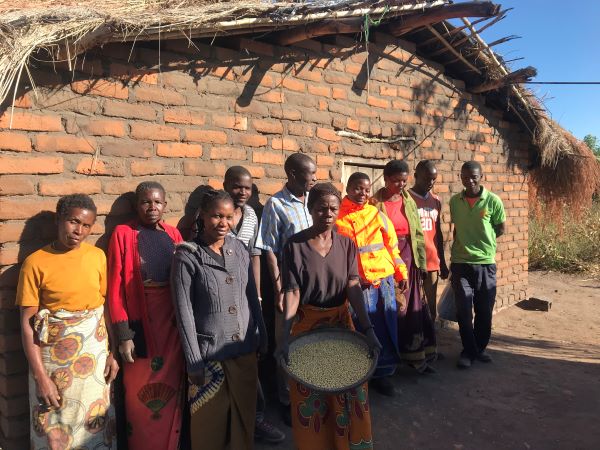Image :“Clinton Foundation / Ariana Constant”
The Clinton Foundation and Africa Improved Foods Limited, one of the biggest processors of commodities in Rwanda, are creating an inclusive supply chain that has already sourced 2.2 million pounds (997 metric tons) of soybeans from smallholder farming communities in Malawi
The Clinton Foundation announced today an expansion of its partnership with Africa Improved Foods (AIF) to help source soybeans from farmers in Malawi that supports farmers’ livelihoods, strengthens local agricultural economies, and makes progress toward Zero Hunger.
Since 2006, the Clinton Foundation’s Clinton Development Initiative (CDI) has worked across Rwanda, Malawi, and Tanzania to increase the cultivation of soybeans asp an alternative to traditional cash-crops such as tobacco. By supporting the transition to soybeans, CDI has been able to build more sustainable and alternative revenue streams for smallholder communities.
For farming communities to fully benefit from this success, it is critical that they become better connected to markets while producing high-quality crops that can be sold at a premium. Traditionally, smallholder communities have struggled to meet the quality demanded by commercial markets, but through intensive community-centered training – CDI’s Community Agribusiness Approach – smallholders in Malawi have been able to meet the strictest quality requirements.
Despite achieving the right quality, CDI Malawi struggled to find a reliable market for the high-quality output it’s farming communities were delivering. Conversely, Africa Improved Foods in Rwanda struggled to find soybeans locally that would meet the operational demands of its business. CDI and AIF – who have long partnered in Rwanda – have expanded this partnership to now source soybeans from Malawi, showing that the quality demanded could be delivered by smallholders. This May, CDI began mobilizing its Farmer Marketing Groups across central Malawi, aggregating soybeans in large quantities to be sold to AIF.

“For years, the agricultural sector has been faced with the dilemma of how to better integrate smallholder farming communities into business models and supply chains. It has been difficult to find enough high-quality soybean in Rwanda. We are very impressed with what CDI and its communities in Malawi have been able to achieve. Their success shows the power of a community-based approach,” explained Prosper Ndayiragije, Country Manager of Africa Improved Foods.
“Farming is a tough business – but with the right mix of opportunities and partnerships, it can be very lucrative. To see the incredible hard work of our smallholder farming partners finally beginning to yield returns for them is both powerful and rewarding. The crops our farming communities in Malawi grow will not only benefit communities and rural economies across Malawi but also contribute to the treatment and prevention of malnutrition among mothers and children across East and Southern Africa,” said Ariana Constant, Director of the Clinton Development Initiative.
AIF will process the soybeans into Super Cereal Plus – a corn-soybean product that is fortified with micronutrients and other ingredients and sold to consumers and humanitarian organizations, including the World Food Program and the International Red Cross. Super Cereal Plus is then used to provide food assistance to communities across Eastern Africa, with an emphasis on malnourished women and children.
The market demand for soybean in Rwanda exceeds 100,000 metric tons annually, but farmer production domestically is far below that – currently estimated at less than 20,000 metric tons annually. With restrictions on imports from Zambia and Uganda, Malawi was a natural fit to satisfy the demand. In just four months of production, AIF has purchased 2.2 million pounds (997 metric tons) of soybeans produced by CDI farming communities in Malawi, generating more than $408,000 USD for the Malawian economy. Having this capital injection go directly into the hands of smallholders is crucially important to build trust in this model.
These types of partnerships – that put the farmers first and benefit all parties – are showing the potential not only of smallholder farming communities, but also of partnerships across borders that help demonstrate ways Africa collectively can achieve a number of Sustainable Development Goals like Zero Hunger, No Poverty, and Economic Growth.
This partnership between the Clinton Development Initiative and Africa Improved Foods Limited continues President Clinton’s commitment to community resiliency and economic growth. It serves as a testament to the impact that collective action across industries and borders can have on the future of developing nations and the wellbeing of their citizens.








